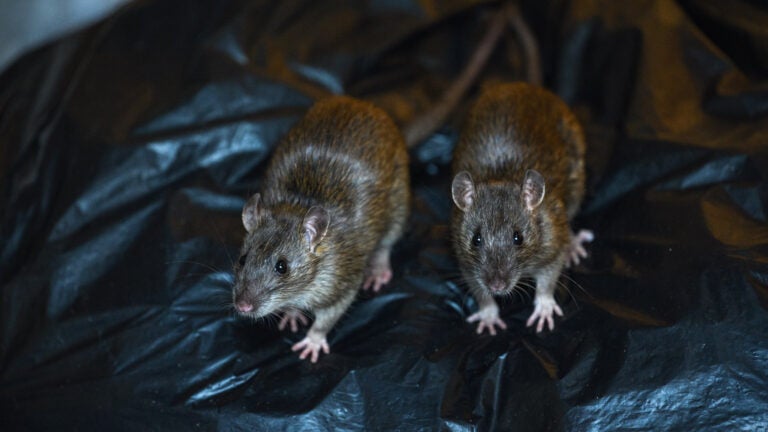Sign up for the Today newsletter
Get everything you need to know to start your day, delivered right to your inbox every morning.

With Boston residents voicing new concerns about growing rat populations and worries mounting over the spread of bacterial disease, officials are set to take a renewed look at the city’s pest control efforts.
Rats are not a new problem for Bostonians, but the pandemic appears to have made the issue more pronounced over the last five years. Mayor Michelle Wu unveiled a wide-ranging initiative last year meant to coordinate city departments and significantly reduce the rat population. But some, including multiple members of City Council, maintain that the administration is not doing enough. The city needs a dedicated “rat czar” and an office specifically focused on pest control, they say.
There appears to be a new sense of urgency around the issue, spurred by the revelation that rats in Boston are carrying and spreading leptospirosis. The disease can cause a wide array of symptoms, and is spread through the urine of infected animals. It is typically more common in tropical regions, but researchers at Tufts University released the results of a study earlier this year showing that leptospirosis is persistent among rat populations in Boston.
Councilors cited that study in a hearing order that was filed last week. Councilor Ed Flynn often raises the topic of pest control and advocates for a new, consolidated approach from the city. When introducing the order at the most recent City Council meeting, Flynn was adamant that rats do present a pressing public health concern for residents. He spoke about hearing more and more from constituents who are concerned.
Councilor Erin Murphy said that she was troubled by the findings of the Tufts researchers.
“[Leptospirosis] is a serious risk for people living on the street, our sanitation workers, and families across our city. We need to know if the Boston Rodent Action Plan is working. We should revisit the idea of a dedicated ‘rat czar,’” she said.
In Boston, pest control is handled by a combination of the Inspectional Services Department, the Public Works Department, and the Boston Water and Sewer Commission. The Wu administration has in the past been resistant to the creation of a dedicated “rat czar” or pest control office.
“The City is continuing to take an all of government approach to reduce rodent population across Boston’s neighborhoods and keep our neighborhoods safe and clean for residents, families, businesses and visitors. This summer, we are coordinating across departments to deploy several innovative, neighborhood-specific measures to address rodent hot spots. The City will continue to partner with community members to address activity quickly and improve their quality of life,” a spokesperson for the Wu administration said in a statement Thursday.
Wu addressed the topic and detailed some of the ways that the city is working to keep rat populations under control in a recent video posted to Instagram.
The hearing order received widespread support from the City Council, indicating an eagerness to hear directly from the administration and outside experts on what can be done to improve the situation.
Meanwhile, residents are continuing to call upon the city for help. Boston’s 311 database currently contains more than 1,600 open reports about rodent activity.
“My elderly mother cannot even walk out from the main building without stumbling on multiple of them. They are everywhere,” one person wrote in a 311 report about a location in Brighton that is experiencing an “unusual” increase in rat sightings.
Another person, who identified as an elderly resident of South Boston, said that they were seeing increased rat activity especially concentrated near a full dumpster. With sanitation workers currently on strike, many locations in Massachusetts are experiencing delayed trash pickups and overflowing dumpsters, potentially contributing to the rat problem.
“I and my neighbors have [seen] a significant increase in rat traffic here this year. Our properties have no outdoor food source. No trash outside. Please investigate and see if you can identify the source of the problem and take steps to eradicate before it gets much worse,” a Mattapan resident wrote in another complaint.
One longtime South Boston resident recently told Boston 25 News that managing rats around his property is becoming like a “second job” and that the city’s response is “not working.”
Flynn participated in a walkthrough of South Boston on Thursday to learn more about the rat problem there.
Today, I joined #Southie neighbors @AndrewSquareCA, @ISDBoston @BHA_Boston for a walkthrough of the area & BHA Mary Ellen McCormack development. We discussed significant increase in rats & coordination of pest control services. It’s critical to report rat activity to 311 #bospoli pic.twitter.com/ZGVsAM0J5e
— Ed Flynn 愛德華費連 (@EdforBoston) July 17, 2025
Ross Cristantiello, a general assignment news reporter for Boston.com since 2022, covers local politics, crime, the environment, and more.
Get everything you need to know to start your day, delivered right to your inbox every morning.
Stay up to date with everything Boston. Receive the latest news and breaking updates, straight from our newsroom to your inbox.
Conversation
This discussion has ended. Please join elsewhere on Boston.com